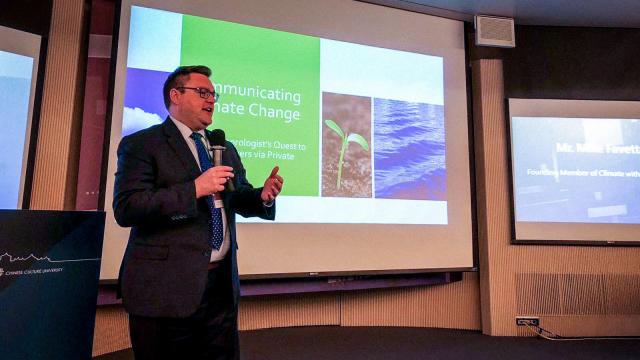Kean Grad Spreads the Word About Climate Change at U.N. Forum

Kean alumnus Michael Favetta ’07 has built a successful career around the weather. Hired as an on-air TV meteorologist while still a Kean student, he later founded a meteorological consulting firm, WeatherPrep, and co-founded the international group Climate without Borders, which works to create broad public support for climate action.
Favetta presented on the topic Communicating Climate Change at the 2019 United Nations Framework Convention on Climate Change NGO Forum, in Taipei, Taiwan earlier this month.
In a Kean News Q&A, he said it’s imperative that the world understands climate change -- and changes its ways.
Q. What is the U.N. Framework Convention on Climate Change NGO Forum? Who else was there?
As a founding member of Climate without Borders, an international group of weathercasters, I was invited to present by the Taiwan Ministry of Foreign Affairs. Taiwan isn't recognized by the U.N. as a member, since it’s a Chinese province, but Taiwan’s government wanted to participate in the U.N. Climate Week. The forum worked to educate and spread ideas to policymakers and government leaders. Top climate researchers were present along with weathercasters from Japan, Austria, Thailand, Australia and the United States.
Q. What were the key points of your presentation?
I spoke on the importance of communicating climate change. TV meteorologists are trusted sources of information, and it’s simple to include facts about climate change in a weather report. I also shared 2018 survey data about the American perspective on climate change versus the Italian point of view. For example, 51 percent of Americans said they thought climate change is happening, compared to 91 percent of Italians.
Q. How significant is the threat of climate change?
In my freshman Meteorology 1000 class with Dr. Charles Murphy at Kean, we calculated the Earth's emissivity -- thet temperatures the Earth is, given the proportion of gases in the atmosphere. That class was almost 20 years ago, but I remember it like it was yesterday. He explained the Earth has an average temperature of about 60 degrees F. If massive amounts of carbon dioxide are added to a planet's atmosphere, the temperature may approach that of Venus ... a planet with runaway greenhouse effect and a molten lava surface. So, yes, (climate activist) Greta Thunberg is onto something. It's imperative we change our ways sooner rather than later.
Q. Some people question if climate change is real. What’s your response?
Thankfully the conversation is changing. Within the past two years, climate change is getting more and more deserved attention and people's views are changing. Survey data backs that up. Regarding deniers, I’m happy to report there are fewer than before. I don't waste my time arguing with people, since there is no debate.
It used to be said that 97 percent of actively publishing climate scientists believe in climate change, but that’s outdated. The new number is 99.96 percent. We are more sure that human-emitted greenhouse gases cause climate change than we are that smoking causes cancer.
Q. What can be done to help address the problem of climate change?
Climate without Borders won an award in Italy for Best Climate Solutions. CwB unites weathercasters around the world to tell the climate story. Understanding a carbon footprint is helpful too. Diving deep into information helped convince me. When I discovered that man-made carbon emissions have a fingerprint discerning them from natural emissions, I was sold. There’s DNA-like evidence to our carbon emissions.
Q. How did your Kean education prepare you for this work?
At Kean, I was one of seven B.S. graduates in Earth science/meteorology my year. I studied abroad in Florence, earned my Italian studies minor equivalency, and interned at Channel 7 in New York and News 12. Those experiences were central to my career path. I was hired two weeks before graduation as an on-camera meteorologist at News 12.
I want to thank Dr. Paul Croft, for getting meteorology students involved in professional organizations and funding us to attend national conferences. Those experiences helped me present as a keynote speaker at many conferences. Networking is important, too, and I wouldn’t be where I am today without his guidance. I’m also presenting in January at the American Meteorological Society annual meeting with my good friend and former classmate, Michele Powers ’06, weekend meteorologist on News 12.
Q. Any other thoughts to share?
My favorite website is skepticalscience.com. It contains hundreds of answers to commonly asked questions about climate change. It’s available in many languages too.